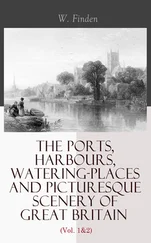Her bravado swiftly fell away. 'On being told that she would be detained for the present, she fell senseless to the ground.' The Somerset and Wilts Journal described her as having succumbed to a 'fit of hysterics'. She was 'unconscious for a few minutes'. When she had regained her senses Foley took her in a trap, a two-wheeled pony cart, to the police station in Stallard Street, Trow-bridge. The superintendent lived in the station house with his wife, his son (a lawyer's clerk) and a servant. The Dallimores - William, the constable, Eliza, the searcher, and their three children - also lived on the premises, and they were given custody of Gough. The nursemaid and the searcher shared a bed.
During her stay at the police station Gough told Foley and his wife that she was sure Constance was not the murderer.
'Was it you?' Foley asked.
'No,' she said.
She remarked to another policeman that she had decided 'never to love another child'. He asked her why. Because, she said, 'this is the second time that something has occurred to a child to which I was attached. In a former place where I lived two years there was a child I was very fond of, and it died.'
A rumour spread that she had confessed, naming Samuel as the murderer and herself as accessory. Several other rumours came into circulation during the week, all of them implicating Samuel: people said that Saville's life was insured, that the body of the first Mrs Kent was being exhumed for a post-mortem, that Samuel was seen in the grounds of his house at three o'clock on the morning of the murder.
On Friday Elizabeth Gough was taken back to Road to be examined. She waited at the house of Charles Stokes, a saddler who lived next to the Temperance Hall, while the magistrates went to Road Hill House. After a while the saddler's sister Ann, a maker of corsets and dresses, remarked on how long the magistrates had been gone: 'I suspect something has been found out,' she said. Gough 'manifested some alarm' and paced the room restlessly. 'I hope I shall not be called in today, for I feel I shall be as bad as I was on Tuesday,' she said, alluding to her bout of hysteria.
'Pressing her hands to her side,' reported Ann Stokes, 'she said she felt as if the blood had gone from one side to the other. She also said that she could not hold out much longer, and that she could not have held out so long but that Mrs Kent had begged of her to do so.' Gough claimed that Mrs Kent had urged her on: 'You must hold up a little longer, Elizabeth; do for my sake.' Afterwards, said Ann Stokes, Gough 'remarked that she had since the murder pulled some grey hairs from her head, which she had never done before, that no one knew how she suffered, and that if anything else occurred she thought she should die'.
In Road Hill House the magistrates interviewed Mrs Kent and Mary Ann Kent. Neither had been able to come to the Temperance Hall, the former because her pregnancy was so advanced, the latter because she was 'seized with violent hysterical fits, on hearing that her presence would be required'.
When the magistrates returned to the hall they summoned Gough. Eight reporters had turned up, but none was admitted - the proceedings were strictly private, they were told. A policeman stood outside to make sure no one got close enough to the doors to eavesdrop.
At about seven o'clock that evening, the magistrates adjourned the inquiry and told Gough she was free to spend the weekend with her father and cousin, who had arrived that afternoon from Isleworth, near London, as long as she returned to the Temperance Hall on Monday. She said she would remain at the police station in Trowbridge. The magistrates probably reassured her before releasing her, for when she reached the town she 'appeared quite cheerful', reported the Bath Chronicle , 'and jumped from the trap in a lively manner'.
On Tuesday, 10 July, an editorial in the Morning Post , an influential national newspaper, ridiculed the efforts of the Wiltshire police to discover Saville's killer. It criticised the rushed, peremptory way the coroner had conducted the inquest, and demanded that the investigation into the child's death be taken over by 'the most experienced of detectives'. The article argued that the security of all the homes of England rested on uncovering the secrets of Road Hill House. It acknowledged that this would mean violating a sacred space:
Every Englishman is accustomed to pride himself with more than usual complacency upon what is called the sanctity of an English home. No soldier, no policeman, no spy of the Government dare enter it . . . Unlike the tenant of a foreign domicile, the occupier of an English house, whether it be mansion or cottage, possesses an indisputable title against every kind of aggression upon his threshold. He defies everybody below the Home Secretary; and even he can only violate the traditional security of a man's house under extreme circumstances, and with the prospect of a Parliamentary indemnity. It is with this thoroughly innate feeling of security that every Englishman feels a strong sense of the inviolability of his own house. It is this that converts the moorside cottage into a castle. The moral sanctions of an English home are, in the nineteenth century, what the moat, and the keep, and the drawbridge were in the fourteenth. In the strength of these we lie down to sleep at night, and leave our homes in the day, feeling that a whole neighbourhood would be raised, nay, the whole country, were any attempt made to violate what so many traditions, and such long custom, have rendered sacred.
These sentiments were felt deeply in Victorian England. On a visit to the country in the late 1840s Dr Carus, physician to the King of Saxony, noted that the English house embodied 'the long-cherished principle of separation and retirement' that lay 'at the very foundation of the national character . . . it is this that gives the Englishman that proud feeling of personal independence, which is stereotyped in the phrase, "Every man's house is his castle." ' The American poet Ralph Waldo Emerson observed that domesticity was the 'taproot' that enabled the British to 'branch wide and high. The motive and end of their trade and empire is to guard the independence and privacy of their homes.'
The Morning Post of 10 July 1860 held that 'in spite of all these proverbial sanctities, a crime has just been committed which for mystery, complication of probabilities, and hideous wickedness, is without parallel in our criminal records . . . the security of families, and the sacredness of English house-holds demand that this matter should never be allowed to rest till the last shadow in its dark mystery shall have been chased away by the light of unquestionable truth'. The horror of this case was that the corruption lay inside the 'domestic sanctum', that the bolts, locks and fastenings of the house were hopelessly redundant. 'The secret lies with someone who was within . . . the house-hold collectively must be responsible for this mysterious and dreadful event. Not one of them ought to be at large till the whole mystery is cleared up . . . one (or more) of the family is guilty.' The Morning Post article was reprinted in The Times the next day, and in newspapers throughout the country over the rest of the week. 'Let the best detective talent in the country be engaged,' demanded the Somerset and Wilts Journal .
On Thursday a Wiltshire magistrate renewed his plea to the Home Secretary to send a detective to Road, and this time the request was granted. On Saturday, 14 July, Sir George Cornewall Lewis, Lord Palmerston's Home Secretary, instructed Sir Richard Mayne, the Commissioner of the Metropolitan Police, to dispatch 'an intelligent officer' to Wiltshire as soon as possible. 'Inspector Whicher to go,' Mayne scribbled on the back of the Home Office directive.
Читать дальше












